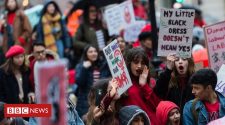
A poll worker at Liberty High School on July 7, 2020, in Jersey City, N.J. | David Dee Delgado/Getty Images
The polls have closed in New Jersey, which on Tuesday held an unprecedented primary election that was delayed five weeks because of the coronavirus pandemic and conducted mainly by mail-in ballot.
Most of the state’s 12 House members, as well as Democratic Sen. Cory Booker faced primary challengers, but the key races were for two House seats in South Jersey.
Advertisement
The election was also a test of the progressive movement in New Jersey in the face of strong Democratic machines that have easily turned back challengers in the past. In one South Jersey district, Republicans had a choice between seeking to win back suburban women who have been fleeing the party or doubling down on perceived loyalty to President Donald Trump.
Though the election was conducted mostly by mail-in ballot, voters had the option of voting in-person by provisional ballot. That’s expected to delay the results, at least in close races. Mail-in ballots will be counted until next Tuesday, as long as they were postmarked by Election Day. Provisional ballots will not be counted until July 15.
In the 2nd Congressional District, which comprises all or parts of eight South Jersey counties, five Democrats vied to take on Democrat-turned-Republican freshman Rep. Jeff Van Drew who, upon switching parties, pledged his “undying support” to Trump.
The race had the added significance of being viewed as a proxy fight between the South Jersey Democratic machine — led by insurance broker George Norcross and state Senate President Steve Sweeney, which supported political science professor Brigid Harrison — and progressive groups aligned with Gov. Phil Murphy and the state’s major public sector unions that backed Amy Kennedy, a former school teacher who married into the Democrats’ most famous political dynasty.
Also running were attorney Will Cunningham, a former congressional staffer, environmentalist John Francis III and former FBI agent Will Turkavage. Cunningham, who is Black, did not pick up any support from the Democratic establishment. He has accused the media of racial bias for focusing on the two white women candidates.
In the 3rd District, which is made up of parts of two counties and stretches from the Jersey Shore to the Philadelphia suburbs, two Republicans vied to take on freshman Democratic Rep. Andy Kim in November.
Kate Gibbs, a 34-year-old former freeholder in Burlington County, had been expected to skate to the nomination, but Van Drew’s party switch changed all that. David Richter, a wealthy former construction company executive had declared his candidacy for the GOP nomination to run against Van Drew, the former Democrat in the 2nd District. But he succumbed to pressure from Republicans who sought to clear the primary field for Van Drew and chose to run in the 3rd District instead.
The race was a battle between the more moderate GOP in Burlington County, which includes the Philadelphia suburbs, and the more conservative party in Ocean County, which includes a number of shore communities. Gibbs had the backing of Burlington County Republicans, who believed a millennial woman was needed to shore up support among the suburban women who have been fleeing the GOP. Richter was backed by Ocean County Republicans and was advised by Trump’s deputy campaign manager, Bill Stepien.
The race was particularly nasty, with Richter cutting an ad that cited some run-ins Gibbs had with the law when she was in her 20s, including a shoplifting conviction, and compared her to the “Jersey Shore” star Snooki. Gibbs accused Richter of being a district-shopper and noted that his company entered a business arrangement with the brother of presumptive Democratic presidential nominee Joe Biden and did work in Libya during the Qaddafi regime.
The 2nd and 3rd District races are expected to be among the most competitive in the state in November’s general election.
Elsewhere in the state, candidates who espouse support for Sen. Bernie Sanders challenged six of New Jersey’s 10 Democratic incumbent House members. Most of the races generated little attention, except for the 8th District in North Jersey, where 14-year incumbent Rep. Albio Sires, accustomed to winning primaries with little effort, was forced to break a sweat against progressive challenger Hector Oseguera. Sires and his allies went negative against Oseguera in the closing weeks of the campaign.
The overwhelmingly Democratic district is dominated by urban Hudson County, just across the Hudson River from Manhattan.
In North Jersey’s 5th District, Democratic Rep. Josh Gottheimer — a moderate who co-chairs the bipartisan Problem Solvers Caucus — faced a challenge from the left from neuroscientist Arati Kreibich. Gottheimer last year angered progressives by supporting a version of a border security bill that passed the Senate over a stricter version in the House.
On the Senate side, Booker faced a challenge from activist Larry Hamm, who helped organize an anti-police brutality protest in Newark in late May that drew thousands. Hamm, a Sanders supporter, was a huge underdog in the race.
The GOP race to take on Booker in November was more competitive, with five candidates vying for the nomination. The contest largely was between pharmacist Rik Mehta and engineer Hirsh Singh. Whoever wins faces the daunting challenge of running against a Democratic incumbent senator in a state that hasn’t elected a Republican to the U.S. Senate since 1972.

















